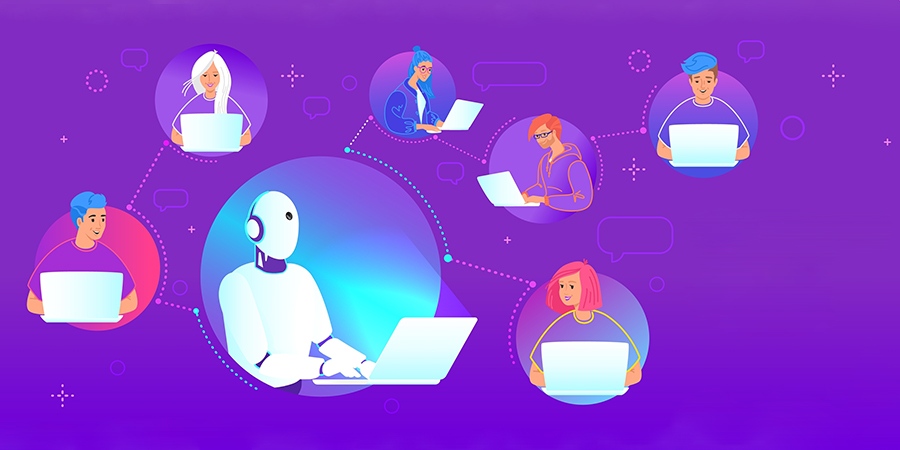Artificial intelligence (AI) is opening up a whole new zone of opportunity with the emergence of an enhanced chatbot that could be the gamechanger across industries, including the academic scene.
ChatGPT is a product of human-AI collaboration. In this context, human trainers are behind the finetuning of OpenAI’s ChatGPT using supervised learning and reinforcement learning. ChatGPT's potential is making headlines because of its conversational capabilities in answering prompts being input by users.
To give you a glimpse, the market size of conversational AI is expected to reach US$1.3 billion by 2025, growing at a CAGR of 24%. A good example of this is a chatbot, one of which is ChatGPT. By definition, a chatbot is an interactive application developed using AI and designed to interact with humans through the textual conversation process. It is commonly integrated with various messaging services in sectors like retail, finance, etc.
Still on its neophyte stage, the controversial ChatGPT is said to be a large language model that can generate readable text on demand in a wide range of styles and for a variety of purposes. These include writing essays, creating lesson plans, conceptualizing research and even answering exams. The AI chatbot does it all in a human-sounding text and with high efficiency, though its accuracy still has room for improvement.
Ongoing Discourse of ChatGPT’s AI Chatbot
ChatGPT has brought mixed responses from school administrators, teachers, parents and students. The ethical questions about how AI fits in education, and the potential for plagiarism and cheating arise, while on the other hand, when used in the right way, ChatGPT can be a friendly tool for students inside, or even outside, the classroom.
A Harvard Graduate School of Education webinar discussed that banning artificial intelligence tools like ChatGPT in schools is the “wrong approach.” In reality, these services could be transformative for the future of education.
New York City Public Schools, the largest school district in the US, announced in early January 2023 that it was banning ChatGPT across all district devices and networks over concerns “regarding the safety and accuracy of content”. Other big US city districts like Seattle, Baltimore and Los Angeles have also blocked access to the app, and many others might follow suit.
Three Australian states – New South Wales, Queensland and Tasmania – have also banned the AI chatbot tool in public schools.
While English teachers are worried about the trustworthiness of future written assignments, Princeton University senior Edward Tian is working on an app that aims to identify and incentivize originality in human writing. GPTZero can help teachers identify whether their students are plagiarizing essays from ChatGPT. The creator said that humans deserve to know when something is written by a human or a machine.
Supporters believe that teachers and students should see ChatGPT as a helpful tool, similar to how a calculator is during a math class. It cannot do a teacher’s job on its own but it can certainly help in reaching learning objectives.
Moreover, ChatGPT is smart enough to pass prestigious graduate-level exams, with passing remarks.
In separate scenarios, the powerful new AI chatbot tool recently passed law exams in four courses at the University of Minnesota and another exam at University of Pennsylvania’s Wharton School of Business.
Professors at the University of Minnesota Law School assessed ChatGPT’s ability to answer 95 multiple choice questions and 12 essay questions and revealed an average grade at the level of a C+ student. This means achieving a low but passing grade in all four courses.
In parallel, ChatGPT earned a B to B- grade on a business management course exam at Wharton. A Wharton business professor said that the AI chatbot did an amazing job at answering basic operations management and process-analysis questions. But on the downside, it struggled with more advanced prompts and made mistakes with basic math.
Additionally, ChatGPT has what it takes to pass the US Medical Licensing Exam. Led by doctors from a medical startup, researchers found that ChatGPT “performed at or near the passing threshold for all three exams” needed to be licensed as a doctor.
Another study found that ChatGPT was only around 50% accurate on the Multistate Bar Examination, a multiple-choice test that comprises one part of the legal licensing process in the US.
Outlook
ChatGPT is simply the latest in a long line of disruptive changes that the academia sector had absorbed — such as the advent of the Internet, Wikipedia and calculators.
It is yet to be proven on how this tool can be utilized productively in helping students become knowledge transformers by honing their critical thinking skills along with their communication skills.
Sooner than later, the learning process will never be the same again as people are increasingly using the AI chatbot. According to the CEO of one of the world’s largest providers of online education, the opportunity from AI for online education is to improve the experience of students.
An AI chatbot like ChatGPT acts more of a synthesizer than a critical thinker. In this case, it will perform well in a compare-and-contrast essay, but is less able to create and defend a unique dissertation.
AI is not fully intelligent as it is still limited to the amount of data it has been trained on. The cognitive ability and real-time reasoning are still human skills that are not integrated with technology. With ChatGPT, for example, the tool does not really understand the information it has. The AI chatbot merely processes and presents the language and facts that it has been fed, making it unreliable for some instances.
While some fear the rapid rise of AI as a nightmare, others view it as another testimony of a technological leap that schools will cope with.
When the beta version of ChatGPT was asked to write an article about its own impact on schools and universities, it declared that it had the potential to revolutionize teaching and learning.






